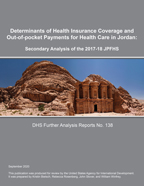There is no printed copy available to order.
Abstract:
As part of the Sustainable Development Goals, United Nations Member States are trying to achieve universal health coverage (UHC) by 2030, which would allow everyone to have access to quality care without financial hardship. The Government of Jordan’s 2016-2020 National Strategy for Health Sector sets out a vision of high-quality lifelong health care for the whole population, with a focus on financial protection. Health insurance provides financial risk protection against illness or injury through risk pooling and is found to lead to better access and less economic burden.
Our analysis finds that the uninsured in Jordan are disproportionately urban, live in Amman, and are non-Jordanian (Syrian and other nationalities). Accidents and injuries are the outpatient services least likely to be paid for with insurance, followed by vaccinations and fevers. For inpatient care, the services least likely to be paid for with insurance are newborn and child care and pregnancy and delivery. Cancer treatment is the most likely to be paid for with insurance, thanks to insurance with exemptions being provided to cancer patients.
Most individuals without insurance seek care in private facilities for both inpatient and outpatient treatments, where they are much less likely to receive free treatment and more likely to pay higher costs. In total, 13% of people seeking outpatient services pay more than 50 dinars, and 30% of inpatient visits cost more than 50 dinars. The highest share of outpatient costs is medication, followed by consultations. People with insurance spend on average 16.1 dinars for outpatient care, compared to 46.2 dinars for people without insurance, while for inpatient care, the gap between those with insurance and those without is much greater: the average cost is 143.7 dinars for those with insurance, 31.2 dinars for those with insurance with exemptions, and 919.3 dinars for those without insurance.
Expanding insurance would reduce out-of-pocket health expenditures, a sizable share of many families’ household expenditures.
 Determinants of Health Insurance Coverage and Out-of-pocket Payments for Health Care in Jordan: Secondary Analysis of the 2017-18 JPFHS (PDF, 3668K)
Determinants of Health Insurance Coverage and Out-of-pocket Payments for Health Care in Jordan: Secondary Analysis of the 2017-18 JPFHS (PDF, 3668K)
 Determinants of Health Insurance Coverage and Out-of-pocket Payments for Health Care in Jordan: Secondary Analysis of the 2017-18 JPFHS (FA138) Analysis Briefs
Determinants of Health Insurance Coverage and Out-of-pocket Payments for Health Care in Jordan: Secondary Analysis of the 2017-18 JPFHS (FA138) Analysis Briefs
